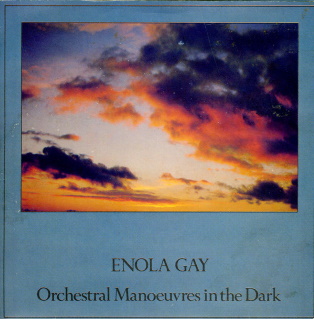Enola Gay (song)
| "Enola Gay" | ||||
|---|---|---|---|---|

Cover of the original 7" single, designed by Peter Saville.
|
||||
| Single by Orchestral Manoeuvres in the Dark | ||||
| from the album Organisation | ||||
| B-side | "Annex" | |||
| Released | 26 September 1980 | |||
| Format | ||||
| Recorded | Ridge Farm Studio, Dorking | |||
| Genre | Synthpop | |||
| Length | 3:33 | |||
| Label | Dindisc | |||
| Songwriter(s) | Andy McCluskey | |||
| Producer(s) | ||||
| Orchestral Manoeuvres in the Dark singles chronology | ||||
|
||||
| Alternative cover | ||||

Cover of the 12" remix single released in 2003.
|
||||
"Enola Gay" is an anti-war song by the British synthpop group Orchestral Manoeuvres in the Dark (OMD) and the only single from the band's 1980 album, Organisation. The track addresses the atomic bombing of Hiroshima on 6 August 1945, during the final stages of World War II. It was written by vocalist/bass guitarist Andy McCluskey.
Along with 1986's "If You Leave", "Enola Gay" has been described as OMD's signature song. The single was an international success, selling more than 5 million copies, while the track became an enduring hit.
Typical of early OMD compositions, the track does not feature a vocal chorus, and is recognisable by its strong, distinctive lead synthesizer hook and ambiguous lyrical content. Most of the melodic parts were recorded on a Korg Micro-Preset, and the drum machine sound was "about the last thing to go on" the recording. The song is based on the 50s progression, which repeats throughout the entire song.
Keyboardist Paul Humphreys and OMD manager Paul Collister were not fans of "Enola Gay" (the latter originally threatened to resign if it were released as a single). Collister did, however, believe it was a surefire hit – a view that drummer Malcolm Holmes did not share. Initially proud of the song, McCluskey's confidence wavered: he re-recorded his vocal, but was dissatisfied with the final mix of the track.
The song is named after the Enola Gay, the USAAF B-29 Superfortress bomber that carried Little Boy, the first atomic bomb to be used in an act of war, dropped on the Japanese city of Hiroshima on 6 August 1945, killing more than 100,000 of its citizens. The name of the bomber itself was chosen by its pilot, Colonel Paul Tibbets, who named it after his mother, Enola Gay Tibbets (1893–1983), who had been named after the heroine of the novel Enola; or, Her fatal mistake.
...
Wikipedia
